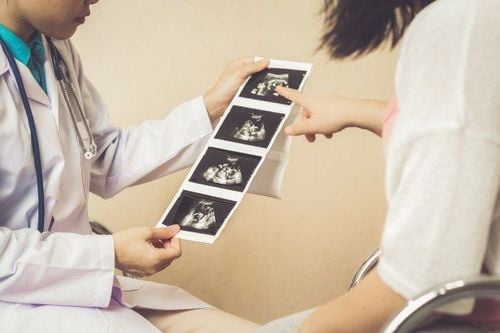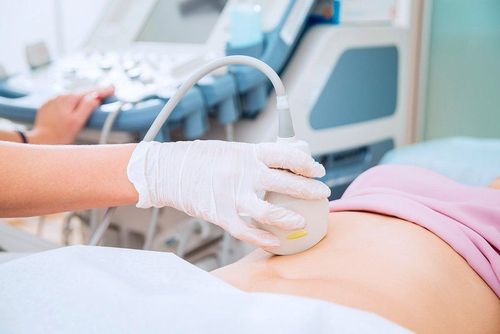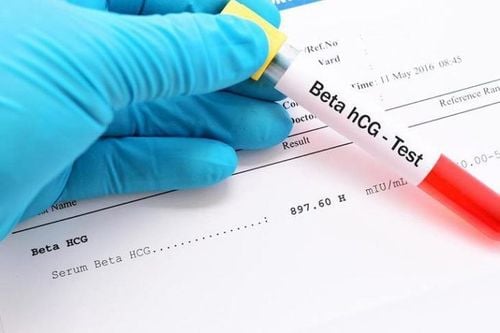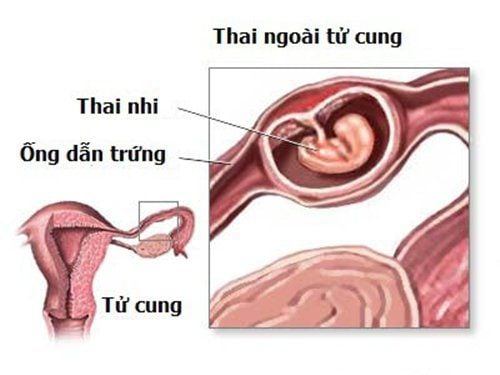This is an automatically translated article.
The article was professionally consulted by Dr. Nguyen Anh Tu - Doctor of Obstetric Ultrasound - Prenatal Diagnosis - Obstetrics Department - Vinmec Hai Phong International General Hospital.Ectopic pregnancy is a condition in which the fetus develops abnormally, easily leading to the risk of miscarriage, stillbirth or endangering the life of the pregnant woman. Therefore, pregnant women need to be diagnosed with an ectopic pregnancy as soon as possible to minimize the risk. Here's detailed information to help answer the questions: Can an ectopic pregnancy be seen on ultrasound? How should an ectopic pregnancy be diagnosed?
1. What is an ectopic pregnancy?
An ectopic pregnancy is also known as an ectopic pregnancy. An ectopic pregnancy is when an egg fertilizes, implants, and develops in a location other than the endometrium, usually a fallopian tube, ovary, abdomen, cervix, or scar from a previous surgery,... This case is difficult to diagnose early because when the fetus is small, there will be no clear signs and the mother with an ectopic pregnancy also has the same symptoms as many other pregnant women. However, when the fetus grows large, if not intervened, the pregnant woman may have miscarriage, spontaneous abortion or rupture of the fallopian tube leading to abdominal bleeding, directly threatening the life of the pregnant woman. .
2. Risk factors for ectopic pregnancy
History of ectopic pregnancy. History of tubal surgery, previous abdominal and pelvic surgery. Pregnant women have pelvic inflammatory disease, some sexually transmitted diseases. The mother has a habit of smoking, is over 35 years old, is infertile or uses other assisted reproductive methods. However, about 50% of patients with ectopic pregnancy have no identifiable risk factors. Therefore, women of reproductive age need to be very careful with ectopic pregnancy.
3. Diagnosis of ectopic pregnancy
Ectopic pregnancy is diagnosed through a pelvic exam, ultrasound, and blood tests that measure βhCG levels.
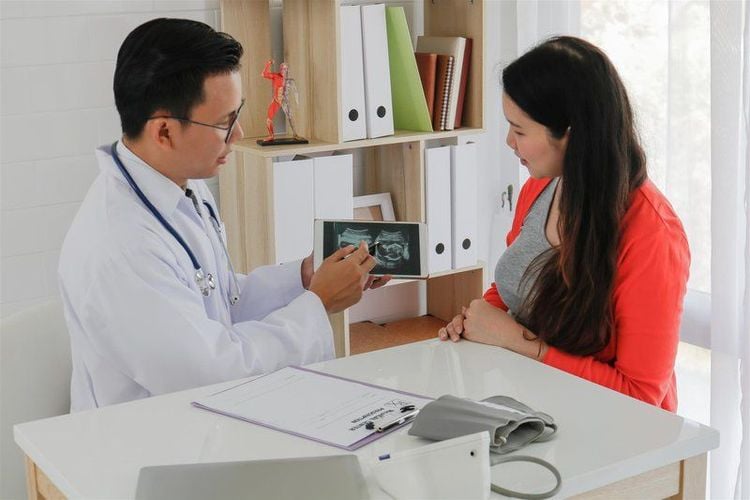
3.1. Laparoscopy
Laparoscopy is known to treat ectopic pregnancy. However, in some special cases or when the ultrasound and laboratory results are not enough to make a diagnosis, the doctor may appoint laparoscopy to diagnose and combine treatment.3.2. Ectopic pregnancy ultrasound
With the question of whether an ectopic pregnancy can be seen by ultrasound, obstetricians and radiologists all confirm: In the first 3 months of pregnancy, ultrasound can detect an ectopic pregnancy. Ultrasound image of ectopic pregnancy is very clear, so the accuracy in diagnosis will reach about 75-80%. When making a diagnosis, doctors will do a transvaginal transvaginal transvaginal ultrasound instead of an abdominal ultrasound. This measure helps the doctor check the vagina, uterus, cervix, size and position of the fetal mass to make a conclusion whether the pregnant woman has an ectopic pregnancy or not.3.3. Blood test that measures βhCG . levels
The uterus is stable. The hCG level increases very little or has reached >1500UI/ml but the ultrasound image does not show the gestational sac in the uterus, the possibility of ectopic pregnancy is very high. When having an ectopic pregnancy, pregnant women need to identify the idea that it is necessary to handle the pregnancy mass as soon as possible to preserve reproductive function and ensure life safety. Therefore, pregnant women do not worry, grieve or blame themselves because this is an incident beyond your control.Obstetricians and gynecologists advise women to have regular gynecological examinations to promptly detect abnormalities in the genitals. At the same time, when pregnant, pregnant women should have their first prenatal check-up as soon as possible to determine if the position of the gestational sac is normal and promptly handle it if there are unexpected problems.
To minimize complications, the first trimester is the most sensitive time during pregnancy. In order for mother and baby to be healthy, parents need to pay attention to:
Understand early signs of pregnancy, pregnancy poisoning, bleeding during pregnancy. Timely, correct and sufficient first prenatal check-up, avoiding too early/too late. Fetal malformation screening at 12 weeks detects dangerous fetal malformations that can be intervened early. Distinguish between normal vaginal bleeding and pathological vaginal bleeding for timely intervention to maintain pregnancy. Screening for thyroid disease in the first 3 months of pregnancy avoids dangerous risks before and during delivery. Currently, Vinmec has many maternity packages (12-27-36 weeks), in which the 12-week maternity package helps monitor the health of mother and baby right from the beginning of pregnancy, early detection and timely intervention. times of health problems. In addition to the usual services, the maternity monitoring program from 12 weeks has special services that other maternity packages do not have such as: Double Test or Triple Test to screen for fetal malformations; Quantitative angiogenesis factor test to diagnose preeclampsia; thyroid screening test; Rubella test; Testing for parasites transmitted from mother to child seriously affects the baby's brain and physical development after birth.
In addition, Vinmec International General Hospital provides pregnant mothers with a comprehensive maternity care program that helps pregnant women to be examined and perform routine tests under the supervision of doctors. obstetrician during pregnancy for timely diagnosis and treatment, to avoid affecting the health of mother and child.
Please dial HOTLINE for more information or register for an appointment HERE. Download MyVinmec app to make appointments faster and to manage your bookings easily.





